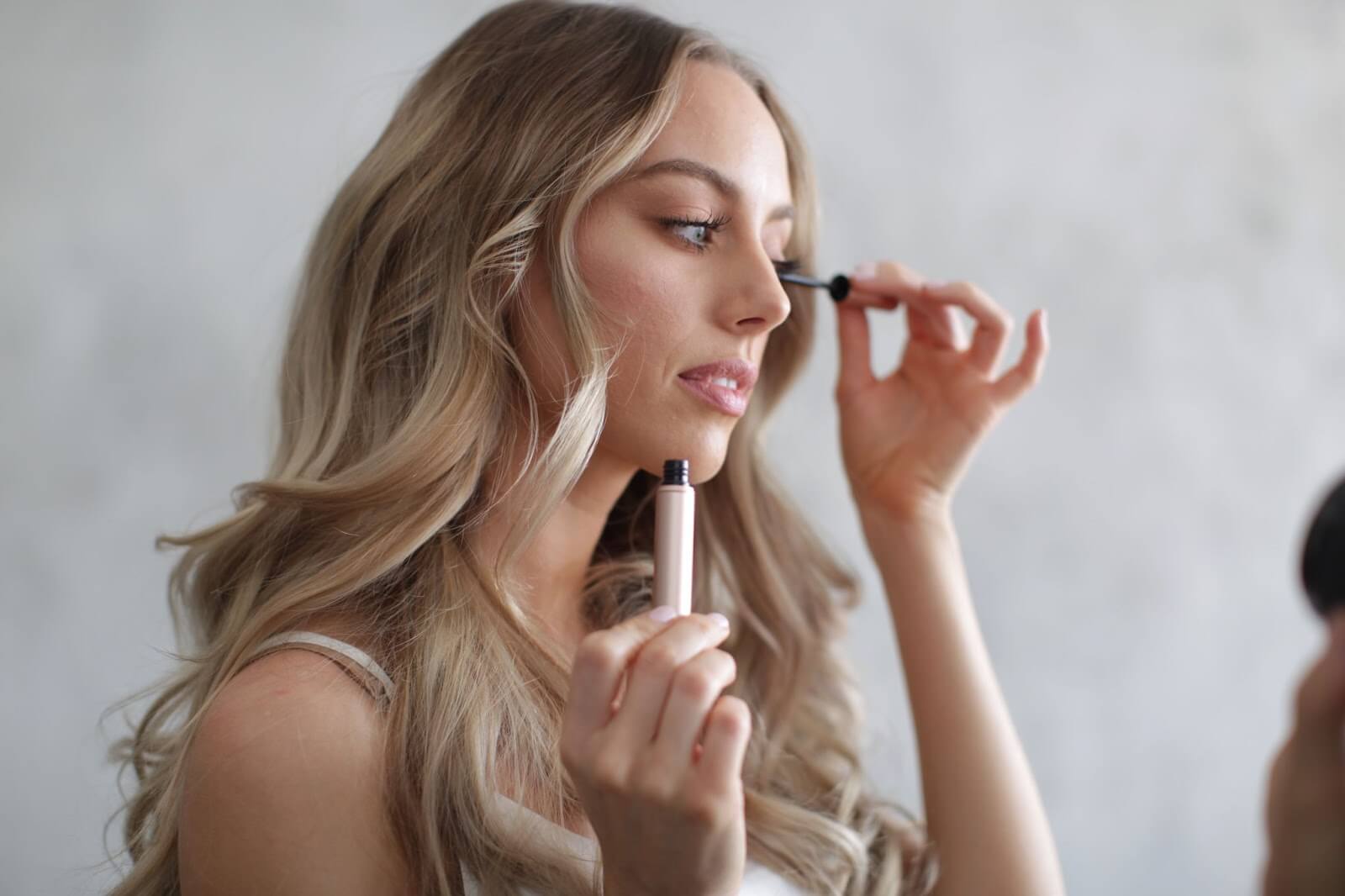If you were privy to primping in the 90s, you might be here because you’ve plucked your brows into oblivion. If that doesn’t ring a bell for you, then maybe you are here because big, luscious brows are in, and yours haven’t gotten the memo.
Either way, we are here to help you create the best possible environment (on your face) to grow some fuzzy caterpillars (eyebrows). We will guide you through diet, eyebrow serum, groom techniques, and natural remedies to find your regimen for thicker brows.
What Affects Hair Growth?
You won’t be surprised to hear that many things affect hair growth: age, genetics, environment, hormonal balance, diet, stress, childbirth, and more. Almost everyone will experience hair loss with aging. Hair grows weaker as we get older.
Women can experience dramatic hair changes due to pregnancy and menopause. Men can experience dramatic changes due to testosterone levels.
Genetics variables affect everyone. Predispositions to genetic disorders can result in hair loss. What you eat and don’t eat can impact hair growth.
As with everything that grows, shows, and flows in the body -- it is a huge balancing act! That’s why it is important to factor in these many variables when you are daydreaming about your personal brow goals.
Improve Your Diet
One place to start that will not only benefit your brow growth, but your overall health is in your gut! A healthy, well-balanced diet can do wonders for the mind, body, and spirit.
The following diet tips are hair-health inspired, but many have additional benefits worth looking into. As always, you’ll want to consult a professional for any major changes you may make to your diet.
Biotin
You may have heard about Biotin concerning hair, nail, and skin growth. It’s a B-Vitamin that has a big reputation for helping out in those areas, but the reality is there isn’t much study-based evidence to back those claims. That being said, dermatologists still suggest taking biotin.
Biotin could help, and it won’t leave you worse-off (just don’t take too much). It can also be taken as a supplement -- up to 3 milligrams a day -- or by eating foods containing higher biotin levels.
Biotin doesn’t have an upper limit, meaning if you take too much, your body can excrete it in a way that isn’t harmful. Some of the most biotin-rich foods include:
- Organ meats
- Eggs
- Fish
- Meat
- Seeds
- Nuts
- Broccoli
- Spinach
- Sweet potatoes
Omega-3 & 6 Fatty Acids
Omega-3 and -6’s are both healthy fats that are important to include in your diet. They have both been known to increase the production of hair growth and thickness as well as help reduce your cholesterol and risk for cardiovascular disease.
Omega-3 fats are found in foods such as:
- Fatty fish, such as anchovies, arctic char, salmon, mackerel, sardines, and trout
- Eggs
- Flaxseeds
- Soybeans
- Canola oil
- Chia seeds
- Walnuts
- Tofu
- Algae (spirulina)
- Fortified foods (like margarine, juice, and yogurt)
Omega-6 fats are found in:
- Soybeans
- Corn
- Nuts and seeds
- Safflower and sunflower oils
- Meat
- Poultry
- Fish
- Eggs
Vitamin D
One part of vitamin D’s job is to regulate the growth of cells that produce keratin in the hair follicle. While there is evidence of a relationship, a direct correlation between vitamin D levels and improved hair growth needs further study.
Vitamin D is also essential for muscle, nerve, and immune system function. Making sure you’re getting enough Vitamin D can be helpful on many levels.
You can find Vitamin D in:
- Fatty fish
- Beef liver
- Cheese
- Mushrooms
- Fortified breakfast cereals
- Fortified orange juice
- Fortified yogurt
- Fortified margarine
- Fortified soy drinks
Iron
If you don’t eat meat on a regular basis, consider adding an iron supplement. Iron deficiency is the most common nutritional deficiency and is especially prevalent in menstruating premenopausal people.
An iron deficiency could also be related to hair loss or thinning. Adding iron as a supplement or to your diet should be something you discuss with a professional, as too much iron can negatively affect the body.
L-lysine
L-lysine is an amino acid that is found in eggs, meat, and fish. Unless you have a consistent diet of those foods, L-lysine is challenging to get through normal food intake. L-lysine is found in the root of your hair and takes responsibility for the shape and volume of your mane. It is also known to be helpful in iron absorption and increasing zinc levels. Results show taking an L-lysine supplement in addition to an iron supplement could improve your hair health results.
Vitamin C
Vitamin C is a powerful antioxidant that protects your body from free radicals and has a role in the healthy growth of collagen fiber. It also is essential for iron absorption and mobilization. For people that may have an iron deficiency, Vitamin C intake is very important. Vitamin C is not easily processed as a supplement, so it’s best to include it in your diet.
Vitamin C is commonly found in foods such as:
- Citrus fruits
- Potatoes
- Tomatoes
- Green peppers
- Cabbage
Vitamin A
Vitamin A works to maintain your immune system, vision, and skin. Unlike some other vitamins, like Biotin, there is an upper limit to how much Vitamin A your body can process. It’s possible that too much vitamin A in your diet can lead to adverse effects, such as hair loss.
Take a look at your diet and supplement ingredients to make sure you aren’t going over the recommended limit for Vitamin A. If you get enough in your diet, you don’t need to take supplements. If you take supplements with Vitamin A, make sure you aren’t consuming too much in your diet. It’s essential to maintain a balanced level in your system.
Regardless of hair growth, having a balanced diet is incredibly important to overall health. Make sure to consider what you don’t eat, what you eat a lot of, and what you find yourself craving. So, how much exercise do you get? How much time in the sun? What is in the water you drink? All of these things factor into possible imbalances in your diet!
Apply A Serum
Maybe you’ve resisted this step thus far in your brow journey, but why not give your over-plucked or under-grown sisters a step up? Put a tool in their tool belt!
A little extra loving never hurt no brow-dy! I’m talking about a specifically formulated serum designed to increase brow growth. That is why we have a solution to recommend to you!
ForChics Eyebrow Growth Serum actually works! It is a follicle-stimulating peptide complex with unique moisturizing agents that provide superior hydration to hair follicles by locking in moisture while improving flexibility and elasticity.
Powerful peptides support the brows natural renewal cycle, making your brows thicker, bolder, and healthier. Nourishing plant ingredients help replenish brows with essential proteins and vitamins that provide luster and shine.
Our products do not include parabens and are also gluten-free and vegan. In fact, our formulas are oil-free and safe to use with lash extensions. A tube of ForBrow will last one to two months, depending on the frequency of application.
Brow TLC
If you want thicker brows, you’ll have to stop with the over-grooming and give your brows some extra lovin.’
This means no more tweezer sessions.
No more magnified mirrors.
No more awkward positions and bright lights.
If you need to groom your brows, try doing so under dim lighting, and don’t put your face so close to the mirror.
Happy Grooming
Massage and comb your brows instead of plucking!
Massaging and combing help stimulate blood circulation, which improves the passage of nutrients and oxygen to the follicle. Combing is also helpful in removing dead skin cells and build-up.
More nutrients and oxygen means more growth, and more growth means thicker brows!
Zinc Pyrithione-Based Shampoo
Speaking of stimulation, even if you don’t suffer from dandruff, using an anti-dandruff shampoo containing zinc pyrithione can stimulate the growth and health of your hair.
Zinc pyrithione is derived from zinc and has antibacterial, antimicrobial, and antifungal properties. It helps clear dead skin cells and regulates oil production, making room for strong and healthy hair to grow.
An eyebrow massage with a little bit of this shampoo could lead to some growth results. If you choose to go this route, be careful not to overuse the shampoo as this will lead to dryness.
Supplement with Natural Remedies
Natural remedies are great because they are just that -- natural! The downside with natural remedies is that many of them don’t have solid study-based evidence with financially backed formulas.
Despite the “lack of evidence,” professionals still swear by some of these supplements and natural remedies because of the promising solutions they see in their own practices.
Coconut Oil
There isn't a lot of study-based evidence that coconut oil helps with hair growth, but like Biotin, it is still highly recommended.
Coconut oil is said to be the best oil to protect your hair. It is a nourishing fatty acid that hydrates and protects the skin (and hair). Not to mention, coconut oil also has antibacterial properties.
When your hair is wet, it is at its most vulnerable. Wetness changes the structure of the cuticle, making it more susceptible to damage. If you are a frequent face-washer, chances are your eyebrow hairs are losing protein with every wash.
You can use coconut oil before or after washing to protect your hair from further damage. Give those brows a gentle coconut oil massage.
Coconut oil can be a bonus if you have normal to dry skin. If you have combination or oily skin, you may want to apply less often.
Tea Tree Oil
Tea tree oil and coconut oil work similarly in their ability to create a protective, moisturizing barrier. Tea tree oil is also a powerful astringent and can help unclog blocked hair follicles.
Make sure you mix your tea tree oil with a carrier oil, like jojoba oil, before use!
Applying tea tree oil alone could result in extremely dried-out skin. We recommend following a skin test before applying tea tree oil liberally.
Saw Palmetto
Saw palmetto is a small shrub-like palm tree. The berries are commonly used in supplements to help treat hair loss as well as prostate health and hormone balance.
Saw palmetto may help reduce the activity of an enzyme in the body that is in charge of converting testosterone into dihydrotestosterone (DHT).
DHT uptake in the hair follicles has been linked to hair loss. Taking a saw palmetto supplement may help counteract hair loss and increase hair density induced by a hormone imbalance.
Wrap Up
Growing thicker eyebrows doesn’t have to be a tedious, everyday challenge.
While following a healthy diet and proper grooming habits will do wonders for brow growth, focus on keeping it simple with ForChics Brow Growth Serum.


















